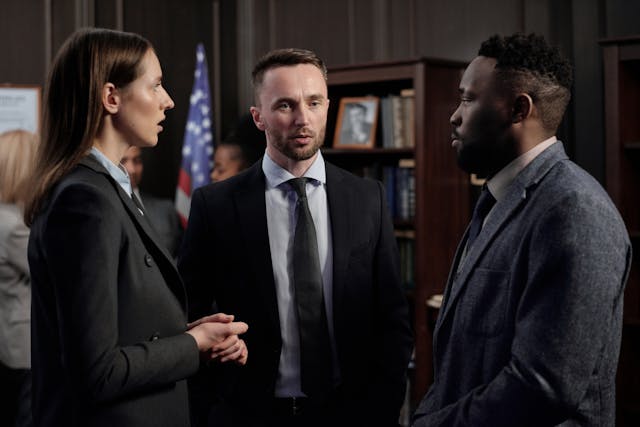A charge can hit your life fast. One day is work, school, and side gigs. The next is a court date that risks your license, your travel plans, and your income. Acting fast and choosing the right lawyer can change the entire outcome.
If you live, work, or travel through New York City, you may want a quick starting point. See how a Manhattan firm explains its scope at https://www.chabrowe.com/criminal-defense/. Use that page as a model for what a serious criminal defense practice should cover, then compare any firm you are considering against the same standards.

Know Your Risks And Rights
Before you compare lawyers, get clear on what is at risk. Jail is not the only concern. A conviction or even a plea can affect your job, professional licenses, travel visas, housing, and future background checks. For side-hustlers, any limit on driving, device use, or platform access can cut off income streams.
You also have the right to counsel. In the United States, the right to a lawyer in criminal cases is protected by the Sixth Amendment.
If money is tight, ask the court about appointed counsel, then measure whether hiring private counsel could still save costs over time. A private lawyer who prevents a criminal record or reduces a charge may protect far more than the fee you pay today.
Choose Experience For Your Charge
Criminal law is broad. You want a lawyer who routinely handles your type of case in your local courts. Read firm pages and ask direct questions.
- What percentage of your practice is my charge type, for example identity theft, DWI, assault, or drug possession
- How many cases like mine have you handled in the past year
- What range of results have you seen, dismissals, pleas to lesser charges, diversions
Ask how the lawyer handles related issues that may matter to you. If you are a gig worker, ask about license risks or platform terms.
If you have immigration concerns, ask how they protect against outcomes that trigger removal or visa problems. A good answer is specific and focused on your facts, not vague promises.
Choose Experience For Your Charge
Most cases end without a trial, so you need someone who can negotiate well and who is respected by local prosecutors. At the same time, you want a lawyer who is ready to push for hearings and trial if needed, because pressure points drive better offers.
Ask for recent examples, without names, of hard plea negotiations or motions the lawyer has argued. Ask how often they file suppression motions, challenge warrants, or attack identification procedures.
Listen for clear, concrete steps, such as filing deadlines, what records they pull, and how they prepare you for each court appearance. If a lawyer cannot explain procedure in simple terms, you may struggle to make informed decisions.
Verify Bar Status And Ethics
A short check can tell you a lot.
- Bar status and discipline history. Search your state bar website to confirm the lawyer is active and to review any discipline.
- Court familiarity. Lawyers who practice often in the same courthouses know calendars, judges, and local rules of thumb.
- Reviews that discuss process. Look for feedback about communication, preparation, and clear billing, not just star ratings.
- Red flags. Hard guarantees, pressure to plead at the first meeting, or fear-based tactics are signs to keep looking.
If your case is in New York, basic court resources and calendars are public, which helps you confirm where your matter will be heard and what timing to expect: https://www.nycourts.gov/.
Make Fees And Scope Clear
Criminal defense fees are often flat for each phase. Get your fee and scope in writing. The agreement should name the charge, the court, and the work covered.
Ask these money questions:
- Is the fee flat, hourly, or blended
- What is covered, arraignment, negotiations, motions, hearings, trial
- What is not covered, appeals, filings for expungement or sealing, DMV hearings
- Are investigators, experts, or transcripts extra, and how are they approved
Compare this cost to the risks you face. If a case threatens a driver’s license or job, a higher upfront fee can still be the cheapest path in the long run. If funds are tight, ask about staged fees based on phases, so you are not paying for a full trial on day one.
Get A Plan For The First Week
Speed matters. Early steps can change evidence and leverage. In your first meeting, ask what will happen in the next week.
Common early steps include:
- Getting the complaint and police paperwork
- Demanding discovery and video
- Securing text records, location data, and witness contact info
- Advising you on what not to do, no social posts, no contact with witnesses
- Checking for diversion programs or treatment options if substance use is part of the case
A good lawyer will give you a short to-do list and explain how each step helps. For example, locating a store camera before footage is overwritten can be the difference between a dismissal and a plea.
Test Communication And Service
Your lawyer should be reachable, plain-spoken, and organized. Pay attention to how the office runs.
- Do they return calls or messages within one business day
- Do they put key dates and tasks in writing
- Do they explain choices and get your consent before big moves
If you work odd hours or deliver on apps, ask for a contact method that fits your schedule. Many firms now use secure portals or encrypted messaging for quick updates. You need a steady cadence of check-ins so you are not guessing about your next court date or what to prepare.
Plan For Sealing Or Record Relief
A smart defense also looks forward. Ask about sealing, expungement, or relief that keeps a case off most background checks.
In New York, certain records may be sealed after time passes if criteria are met. If your case could affect immigration, licensing, or travel, ask how plea wording protects you later. If you hold rideshare or delivery accounts, ask about any required reports and how to frame them.
Finally, update your personal systems. Set up a simple record of court papers, deadlines, and payments. Add calendar alerts for future steps such as sealing eligibility.
If you learned that certain habits or locations increased your risk, write out a plan to avoid repeating them. Small changes protect your time and income.
Use This Quick Checklist
Print or save this list. Bring it to your consults.
- Experience with your exact charge, in your court, in the past year
- Clear plan for the first seven days
- Real examples of negotiations and pretrial motions
- Written fee and scope, with phase breakdowns
- Honest talk about risks to job, license, immigration, and travel
- Communication plan that fits your work schedule
- Plan for sealing or record relief after the case
- Comfort level. You should feel heard and informed
A lawyer who meets these points is more likely to protect not only your case, but your future earning power and options.
Takeaway
A legal problem does not mean your financial goals stop. With fast action, the right questions, and a lawyer who fits your needs, you can reduce damage, keep work moving, and rebuild with a clear head.



Leave a Reply